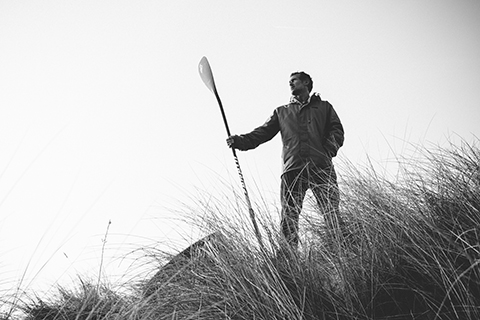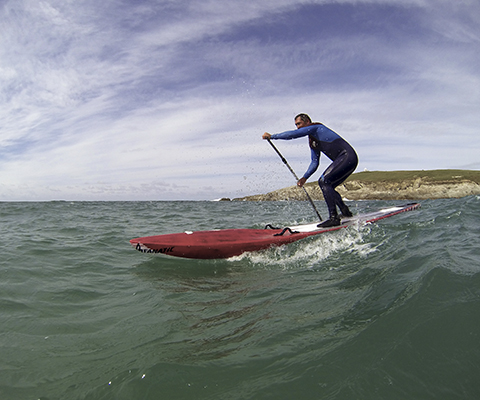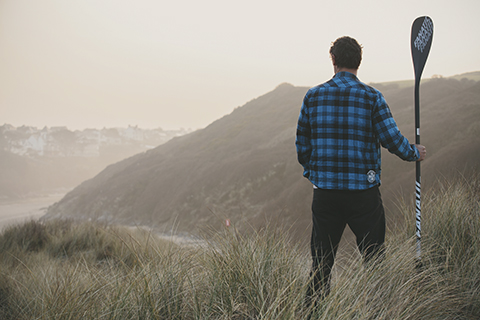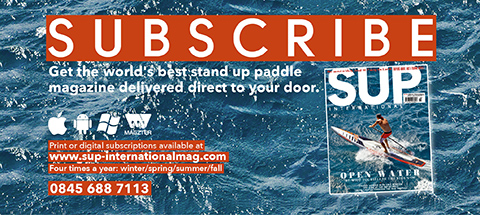THE BLUE GYM – RECONNECTING WITH YOUR INSTINCTS
When you look at the development of sports it seems most likely that they are ritualised versions of other activities. The most popular theories suggest that team sports, football, rugby etc…are highly formalised combat substitutes. Putting it bluntly, your chances of survival are better if you’re on the winning side and therefore your genetic material has a much better opportunity of being passed on.
Words Rob Small // Photos Cameron McKinley-Rogers
Well so far so good, no great revelations there but what about free sports and solo sports? Again we can look to a martial background as the origin of many sporting endeavours. Boxing, martial arts, wrestling, fencing…fighting, no more no less. Javelins, archery, hammers, discus, not a massive mental leap to see what they were designed for, perhaps hunting and perhaps hunting your rivals in the big survival game. Free sports, the less contrived ones at least, often have useful skills at their core too. Climbing, free diving and such like are all handy in getting the edge in stressful times.

Transport, a vital component of day-to-day existence since Homo Sapiens started his journey out of Africa to conquer the world again has made a contribution to the modern pantheon of sports. Most probably the Inuit inventor that conceived the kayak did so because it improved quality of life, not so that an English accountant could win a gold medal in the London Olympics. Which of course introduces stand up paddle into this little (and most certainly speculative) piece. Activities resembling SUP have sprung up independently in many places and times around the world, Peru, South East Asia, Venice (!), which is to say that the idea of standing on a floating object and propelling it with a paddle (or pole) clearly functions and reoccurs when it’s the best solution.
So one can imagine that necessity, environmental pressures, the need to be alive long enough to pass that genetic parcel on has given the motivation for the greater part of human history to get out there and engage in an activity that we now class as sport. You can almost see the hunter gather wives berating the chaps to stop talking about who makes the best arrows whilst they sit under a shady tree and to get out there and actually use some to bring some dinner home for the hungry kids. Which presumably involves running some much faster prey animal down, dispatching it, converting it into transportable chunks and returning whatever distance it is back to camp.
Again one can surmise that those individuals who were good at getting game held better prospects in the pass-the-genes-parcel stakes. Something that certain modern sportsmen seem to enjoy greatly. So when did activities that were essential to survival become sports? The most likely suggestions are closely related to how the structure of society has changed. Until the industrial revolution, day to day existence in an agricultural economy obliged a great percentage of the population to a heavy physical workload. Yes recreational sports and games emerged but for the most of us popping down the beach for a quick session before getting the harvest in was unthinkable and unthought-of.
“ We enter the Information Age and another revolution in how we work and live: urban societies with work and social patterns that involve less and less imposition of physical activity ”

With the industrial revolution and the urbanisation of the populace we see the emergence of team sports, something evident today with the obscene amounts of money involved in the global football game. The process continues as we enter the Information Age, another revolution in how we work and live: urban societies with work and social patterns that involve less and less imposition of physical activity. For some of us shuffling to the coffee machine is the only movement we manage during the working day. We’ve removed ourselves from the food web and mostly our work can be achieved from a keyboard, much like the one I’m writing this on! In fact we can combine the two and order our weekly shop online and have it dropped off without us even leaving the house. In short, there’s almost no extrinsic motivation for us to engage in sports even as replacements for what were once essential for survival.
However there is most certainly a basic drive for physical wellbeing, and of course the associated psychological and emotional benefits. Swimming is the most popular sport in the UK at present with about 4 million participants, practiced for the most part in pools across the nation. Gyms spring up all over the place, the fitness industry apparently in growth. It strikes me that these environments service the desire to be healthy and for urban populations may be the best and sometimes only option available. But for a highly adaptive animal that evolved to run long distances on the plains of Africa, coping with stressful (heat) conditions that considerably faster and stronger prey animals couldn’t deal with, it seems a bit staid. Fitness for fitness’ sake, better than 20 Lambert & Butler a day but surely there’s better ways to get out there and move?

Enter stand up paddle. As a life-long surfer I find it difficult to comply with the fitness for fitness’ sake model. Perhaps I lack the discipline to keep to regime, a sentiment that many of my peers echo. SUP represents another way, once the paddler makes the jump from very high volume entry level equipment in flat water, something only slightly more strenuous than walking to the shops. What a wonderful opportunity stand up paddle represents to get back into the environment, be it SUP surfing, whitewater or touring the Scottish Lochs. We get to go out into the world, experience the elements from within. And the benefits? Well part from the joy of the act itself there’s a lot to learn about SUP skills, about the water and weather and about ourselves. And incidentally our fitness, health and wellbeing increase. Fitness through fun. And just maybe, there could be the opportunity to play pass-the-genes parcel…but that as they say is another story!
Many thanks to Dr Paul Russell for his encouragement and the title ‘The Blue Gym’, which I blatantly appropriated from him. SUP


